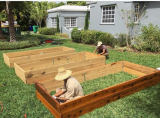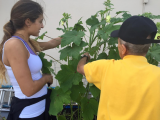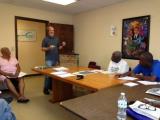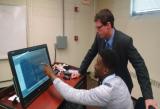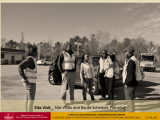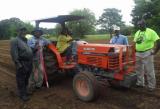College/Underserved Community Partnership Program (CUPP)
On this page:
Overview
The College/Underserved Community Partnership Program (CUPP) provides a creative approach to partnering and delivering technical assistance to small underserved communities from local colleges and universities at no cost to the communities. By leveraging partnerships with colleges and universities, including Historically Black Colleges and Universities and Native American Colleges and Universities, the program combines environmental justice concerns and mission related objectives of multiple agencies with core curriculum objectives of local colleges and universities.
Communities benefit from the investment of innovative technical assistance and approaches provided by students attending nearby academic institutions. Students benefit by utilizing their learned curriculum to gain practical experience that can serve as a resume builder, while earning course credits through their academic institution. Federal agencies benefit from the interagency collaboration by seeing an improvement in the effective and efficient use of resources.
Program Partners
The CUPP is designed to promote interagency collaboration (federal, state, local, and tribal) with emphasis on community engagement, as well as, to facilitate public-private partnerships between schools, communities, the private sector, and nonprofit organizations. Currently, there are 34 schools partnering with more than 60 communities in 14 states. The program also has support from the Civilian Conservation Corps, Regional Coastal Commission in Georgia, Union of Concerned Scientists, Thriving Earth Exchange and the following federal agencies:
- US Department of Agriculture (USDA)
- US Department of Energy (DOE)
- US Department of Health and Human Services (HHS) Public Health Office (PHO)
- US Department of Interior, National Park Service (NPS)
Program Objectives
The CUPP is based on developing partnerships between small, underserved communities and geographically close colleges/universities to provide a variety of technical support at no cost to those communities. This geographical proximity enables the colleges/universities to maximize the support provided by college students in their area of academic study while being overseen by professors supporting the effort. It is the intention of the CUPP to promote long term relationships between participating schools and communities which will create healthier and functionally improved communities.
Program Examples
Florida International University
Medley, FL
- Students developed a storm water mitigation plan.
- A communication plan was created to preserve and protect fresh water resources.
- A food garden was designed and planted to address food desert issues; residents were also taught how to maintain it.
- Students will be working with the city to develop a sustainable economic development plan
University Of North Carolina (Wilmington) (UNCW) And Brunswick Community College (BCC)
Navassa, North Carolina
- University of North Carolina -Wilmington (UNCW) and Brunswick Community College (BCC) are partnering with the Town of Navassa, which is home to about 1,800 residents and nearly 1,000 acres of former industrial sites including two federal Superfund Non-Time Critical Removal Actions, one Superfund Alternative Site, and several state-led investigations and cleanup actions. The EPA Region 4 Superfund program found that this historically underserved community had unmet needs outside of the scope of the EPA Superfund program. The Navassa community’s concerns included economic development, poverty, health, land use planning, zoning policy, housing, cultural, and returning industrial sites to productive use. The EPA CUPP approach found local academic institutions that can provide broad support to the community. UNCW is providing community support from expert faculty in geology, marine sciences, history, policy, public health, nursing and planning. UNCW has conducted educational demonstrations, helped the Town develop proposals for natural resource restoration projects, and is planning additional support in health, policy, planning, historical archiving, and grant writing. BCC will provide support for workforce training. This support will help the community address economic, health, environmental and cultural needs that might otherwise remain unmet.
Savannah State University
Midway, Georgia
- Students designed and drafted conceptual site plans, building designs and a 3-D version of a new municipal building complex that will service the needs of the constituents.
- Students teamed up with Thriving Earth Exchange’s volunteer scientists to integrate sustainable design features within Midway, GA’s Municipal Complex redesign to make a more environmentally-friendly and resilience-focused building by using EPA and LEED standards.
- This project aims to produce a “green” and resilient-minded Municipal Complex design plan for the city of Midway, Georgia, and to prepare a cost analysis to ensure the plan can be realistically fabricated within the given budget. To learn more about this project and to review the plans for the future municipal complex. Please click on the following link: http://thrivingearthexchange.org/collaborative-building-design-brings-together-engineering-students-and-local-community/Exit
Tuskegee University
Shorter, AL
- The students were charged with supporting and executing a pilot agricultural project, which performed so well the City made thousands of dollars selling extra produce at roadside stands.
- They designed a project to use solar panels to power three sewage lift stations.
“We the town of White Hall really appreciate the help and support we have gotten from EPA’s College/Underserved Community Program (CUPP) and Tuskegee University. The alternate transportation project plan that Tuskegee has developed was the number one priority for our town, and many others along the Selma to Montgomery Trail. As a result of EPA and Tuskegee’s support, we can now see this project becoming a reality. We thank you for all of your hard work and future works.” James Walker, Mayor of White Hall, AL
Selma to Montgomery Trail (Voting Rights Trail)
- Community meetings were organized in various cities along the Selma to Montgomery Trail which resulted in the formation of the Tent City Economic Empowerment Group. This collaboration represents the first time that these towns have worked together to obtain grant funding.
- Students developed a detailed alternate transportation plan which included seven evening meetings to gain the input and support of local communities.
“We appreciate the support of Tuskegee University for this project, and the EPA for using the CUPP Program to bring the school and the city together. This collaboration will help us reach our goals and visons for the city.” Harold Powell, Town Clerk, City of Shorter, AL
CUPP Conference
The 2016 CUPP conference, held in Atlanta, Georgia, included over 100 participants from various communities, federal, state and local agencies. This two-day conference included sessions specifically designed for city and community leaders, academic partners and other interested parties. Governmental agencies provided grant and loan trainings, the Union of Concerned Scientists provided training on how to identify and engage communities vulnerable to sea level rise, and students from various CUPP partner schools presented their completed projects.
Get Involved
For more information, please contact Michael Burns, CUPP Program Manager at 404-562-8228 or email at burns.michael@epa.gov.

